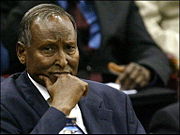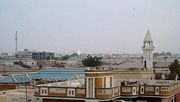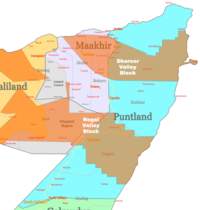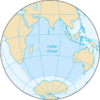Puntland
From Wikipedia, the free encyclopedia
|
Puntland State Of Somalia
أرض البنط |
||||||
|---|---|---|---|---|---|---|
|
||||||
| Anthem: Puntland Somali National Anthem |
||||||
| Capital | Garoowe | |||||
| Largest city | Bosaso (Commercial Capital) | |||||
| Official languages | Somali and Arabic | |||||
| Government | ||||||
| - | President | Mohamud Muse Hersi | ||||
| - | Vice-President | Hassan Dahir Mohamud | ||||
| Independence | From Somalia | |||||
| - | Proclaimed | 1998 | ||||
| - | Recognition | Unrecognized | ||||
| Area | ||||||
| - | Total | 250,000 km² 96,526 sq mi |
||||
| - | Water (%) | Negl. | ||||
| Population | ||||||
| - | 2003 estimate | 2,400,000[1] (140th) | ||||
| - | Density | 11.3[2]/km² (205th) 29.3/sq mi |
||||
| Currency | Somali shilling (SOS) |
|||||
| Time zone | EAT (UTC+3) | |||||
| - | Summer (DST) | not observed (UTC+3) | ||||
| Internet TLD | .so | |||||
| Calling code | +252 (Somalia) | |||||
| Rankings may not be available because of its unrecognized de facto state. | ||||||
Puntland is a region in northeastern Somalia, centered on Garowe (Nugaal region), whose leaders declared it to be an autonomous state in 1998. Unlike neighbouring Somaliland, it does not seek outright independence from Somalia. The name is derived from the Land of Punt mentioned by ancient Egyptian sources, which is believed by some to have existed in what is now Somalia.
Contents |
[edit] History
Puntland considers itself an autonomous region within Somalia. In 1969, when Somalia's government was toppled in a coup d'état, years of war and chaos followed. An unsuccessful invasion of Ethiopia followed the Soviet Union's change of support from Somalia to Ethiopia, caused by the rise of a pro-Soviet government in Ethiopia. Left without Soviet support, Somalia turned to the United States, which allowed Somalia's self-proclaimed president, Siad Barre, to stay in power through the end of the Cold War in 1991. When the Soviet Union collapsed, the Americans withdrew their support of the Somali government, and Barre was overthrown.
Following these events, Somalis remained without a strong government, with constant wars ravaging the southern part of Somalia. These events led to the 1991 de facto secession of the Somaliland region of Somalia, which in 1960 had enjoyed a few days of independence. Violence continued throughout the country, prompting a United Nations peacekeeping force to be sent to war-torn Somalia. The relief effort ended however on March 3, 1995, almost two years after the Battle of Mogadishu when two American MH-60 Black Hawk helicopters were shot down and 18 soldiers were killed.
Somalia remained unstable, and Puntland declared its autonomy in 1998. Although it is a tribal-based separation under the presidency of Abdullahi Yusuf Ahmed (deputy president of the Somali Salvation Democratic Front), Puntland is a region with clan confederation as one of its top priorities. Since 1998 Puntland has also been in territorial disputes with Somaliland over the Sool and Sanaag regions. Yusuf was an army major when he sought political asylum in Ethiopia. He led the first group of resistance fighters belonging to Majeerteen tribe, whose ultimate goal was to free Somalia from dictatorship.
Unlike the secessionist region of Somaliland, Puntland is not trying to obtain international recognition as a separate nation. It considers itself a federal division within a united Somalia that is a federal republic. But the two so-called "lands" have one thing in common: they both base their support upon clan elders and their way of organization along lines based on tribe and kinship. The Somali capital Mogadishu, and other southern cities, are said to have developed much less than cities in Puntland and Somaliland (e.g. Bosaso, Hargeisa, Las Anod, Garowe, etc.) These two self-declared independent regions obtain their economic and political support from Ethiopia, historically an adversary of Somalia.
Puntland began experiencing political unrest in 2001 when President Ahmed wanted his term to be lengthened. Ahmed and Jama Ali Jama fought for control of the country, which Ahmed won in 2002. Ahmed served as president until October 2004 when he was elected President of Somalia. He was succeeded by Muhammad Abdi Hashi who served until January 2005 when he was defeated for re-election by Parliament, which elected General Mohamud Muse Hersi ("Adde"). In December 2004, Puntland sustained serious damage during the tsunami following the 2004 Indian Ocean Earthquake.
In November 2006, the Union of Islamic Courts reportedly captured Bandiiradley, a strategically located settlement near Puntland's border with Mudug. However, a spokesman for local warlord Abdi Hassan Awale Qeybdiid claimed that his troops had only made a tactical retreat from the area. Mohamed Mohamud Jama, a Mudug-based spokesman for the Islamic Courts, announced the courts' intention to march on Gaalkacyo, part of which is claimed by Puntland. Heretofore, the courts had avoided making incursions into Puntland.[3] That same month, General Adde announced that he would rule according to Islamic law but in a different way from that of the Islamic Courts in order to avoid "politicising religion." Adde then announced that Puntland would resist any attack made by the Islamic Courts. [4]
Tensions between Puntland and Somaliland heightened to a violent clash in October, 2007.[5]
[edit] Politics
President Mohamed Musa Hersi dismissed the parliament of Puntland on December 9, 2007, and effectively rules by decree.[6] This follows a year of defections and secessions from Puntland over the increasingly autocratic governing style of the president sparked initially by a demand earlier in 2007 for an audit of the budget. Fallout from this political crisis include the defection of Ahmed Abdi Xabsade to Somaliland and the invasion of Sool by Somaliland and his supporters, the secession of Puntland-controlled Sanaag and subsequent creation of the state of Maakhir, and recently the defection of the commander of Puntland military forces in Sool to Somaliland.
[edit] Economy
Puntland has 1600km of coastline, which is abundant with fish and other natural marine resources. However, after the collapse of the Somali central government in 1991, the coast was left unguarded against foreign intruders. As a result, many ships equipped with heavy trawls and other unlawful fishing equipment have worked in Puntland's territorial waters. These ships violate catch regulations, including some which keep their catch alive and stock them in waters where fishing has been depleted. Puntland's coastal authorities continue to receive complaints from local fishermen about the damage being done by these outsiders.
Puntland exports great quantities of seafood such as lobsters, dried fish, shark vines, and tuna. Sea salt is also produced.
Other economic products and activities of Puntland include livestock, frankincense, gum arabic, manufacturing and agriculture.[1]
In Lasqorey district there is a medium size fish processing plant that produces and processes great quantities of tuna fish. The products of Lasqorey fish factory reach commercial level, and its tuna are found throughout Puntland and also outside the region. A fish processing plant is also being constructed in Habo, which locals hope will reduce poverty and unemployment and improve the economy of the area.
Piracy threatens shipping near the Puntland coast, with pirate crews operating out of ports on the coastline.[7]
[edit] Geography
Puntland occupies the following Regions of Somalia:
- Nugaal
- Garoowe (State Capital)
- Eyl
- Burtinle
- Dangorayo
- Godob Jiraan
- Bari
- Bosaso (Regional/Commercial Capital/ largest city)
- Qandala
- Carmooyin
- Ufeyn
- Bander Siyada Qow
- Bali Dhidhin
- Calula
- Bargaal
- Hafun
- Isku-Shuban
- Yalhoo
- Karin
- Karkaar
- Mudug
- Gaalkacyo (Regional Capital)
- Galdogob
- Jiriiban
- Bacaadweyn
- Tuulo Buuryaqab
- Bursaalax
- Sool
- Sanaag
- Cayn
The regions of Sool and Sanaag are in dispute, as these territories were claimed as part of the de facto self-declared state of Somaliland which formed in 1991, as being historically part of British Somaliland. Beginning in 2003, the forces of Puntland entered and occupied the eastern parts of Sool region based on irredentist desires, due to the large Darod clan population in the area. Fighting between the two forces led to casualties and captured prisoners, who were later exchanged. As a related contention, in 2005 Puntland tried to sell off mineral rights to foreign investors, including the disputed territories of Sool and Sanaag.[8][9]
As of October 20, 2007 Puntland controls no territory in either Sool or Sanaag.
[edit] Oil exploration
Puntland signed a deal with Consort Private Ltd for exclusive oil exploration rights in Puntland, interpreted in the original agreement as including Bari, Nugaal and Puntland's Mudug, Sool, Sanaag and Cayn regions. Consort then sold a controlling share (50.1%) to Range Resources of Perth, Western Australia to carry out the actual exploration. [10]
Canmex Minerals of Canada signed an agreement with Range Resources for Canmex to open oil production on 80% of any oil discovered. In return, Canmex will foot the bill for exploration, amounting to up to ~$70 million, plus a $5 million signing bonus for Range. On August 23rd, 2006, Canmex changed its name to Africa Oil Corp.[11] The company continues to be based in Vancouver, British Columbia, Canada.[12]
[edit] Criticism
The manner in which Puntland and their partners (Range Resources LTD, Canmex/African Oil Corp and other linked parties) have explored for minerals, oil and gas in the Dharoor and Nugaal valley has drawn criticism both within Puntland, Somalia and in the diaspora. Somalia is a patchwork of overlapping administrations, clans and traditional authorities, which in Puntland includes the Transitional Government, the Puntland Government, various traditional Harti clan leaders, and individual loyalties to a particular warlord or business leader. The President of Puntland has chosen to place himself above all these other authorities within Puntland, and the oil, mineral and gas exploration in Puntland has become an engine empowering conflict and war in northern Somalia. Since exploration began, this has spawned Puntland's war with Somaliland, Maakhir's break with Puntland, Somaliland's war with Maakhir, gun-battles outside of the Puntland State legislature, and a great deal of political uncertainty.
The Northern Somali Unionist Movement is a Somali organization of unknown size or influence that claims members and supporters from Sool, Sanaag and Cayn regions in the northern regions of Somalia in which some promising geological formations lie. They have issued a warning[13] to mineral and oil prospectors companies claiming that they view their agreement with the Puntland and TFG governments regarding the SSC region as illegitimate and non-binding without the prior sanction and agreement of the traditional leaders and the civil society organizations of the area.
[edit] Media
Radio Gaalkacyo is the state radio station formerly called Radio Free Somalia. XargagaOnline [14] is the main news portal (mostly in Somali) for the current events and news from Sool, Sanaag and Cayn regions.
[edit] See also
[edit] Notes
- ^ Puntland State Of Somalia
- ^ Puntland State Of Somalia
- ^ "Islamists 'take key Somali town'", BBC News, BBC (2006-11-12). Retrieved on 2006-11-13.
- ^ Puntland 'to fight Islamic courts', Al Jazeera, 21 November 2006
- ^ Al-Jazeera: Rival Somali regions in armed clash.
- ^ Somalia: Puntland President Rules By Decree, Not Democracy (AllAfrica)
- ^ Wallis, Daniel (2008-08-29). "Somali pirates a growing threat to shipping" (HTML), Africa.Reuters.com, Reuters. Retrieved on 2008-09-06.
- ^ "Somalia's Puntland Sold Exploration Rights In Somaliland", Somaliland Times (2006-02-01).
- ^ "Somaliland, Puntland Exchange Detainees", Somaliland Times Both regions have declared themselves separately autonomous parts of Somalia as Northland State (2008) and Maakhir State (2007) respectively. (2005-12-07). Retrieved on 2007-01-18.
- ^ Abdillahi Yusuf’s Transitional Government And Puntland Oil Deals (sic)
- ^ Oil and Mineral Exploration in Puntland, Somalia
- ^ CompanyMine information on African Oil Corp
- ^ ::Xargaga Online::
- ^ XargagaOnline
[edit] External links
- Official Website: Government of Puntland
- Map of Puntland: Landmine Impact Survey, 2005 (4.3MB PDF file)
- Puntland: UN-OCHA Overview (PDF file)
[edit] News
- BBC: Islamists 'take key Somali town' (in Puntland) November 12, 2006
- HRNet Information about Puntland and Somalia
- GaroweOnline.com: Breaking news, ed/ops through Web & Radio broadcast!
- Allpuntland.com: News, information, entertainment and more
- BBC: "Somali warlords battle for Puntland" May 7, 2002
- Puntlandpost.com: News
- Wardheernews.com: News and commentary
- Wayaha.com: News
- Laasqoray.net: News
- Dhahar.com: News
- Somalia Online: News and discussions
- Somalia INFO: Full of INFO
- Hafun.Org: News Agency
[edit] Politics
- "Position Paper of Harti, Geri, Abdi Koobe, and Isse DAROOD of Puntland State of Somalia, and Jubaland" at Allpuntland.com
- African Elections Database: "Elections in Puntland"
|
||||||||
|
||||||||||||||||||||||||||
|
||||||||||||||||







